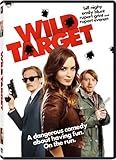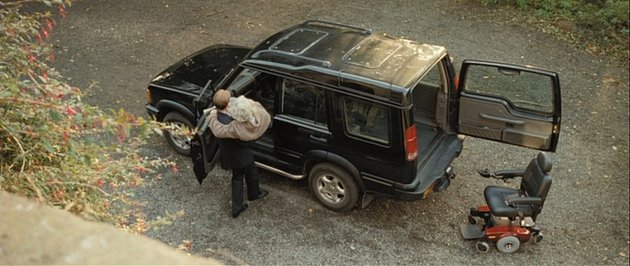 Victor Maynard of Wild Target was born to be a hit man; taught the family trade by his father and his career nurtured by his formidable mother Louisa. Louisa lived with him in the large ancestral home until recently, when (though there was an old-fashioned lift installed in the house for her wheelchair) she moved to an assisted living facility in London. Victor visits her regularly, where she is apparently still ruling the roost, dressing elegantly, serving tea, and keeping close tabs on her son’s career and (lack of) love life.
Victor Maynard of Wild Target was born to be a hit man; taught the family trade by his father and his career nurtured by his formidable mother Louisa. Louisa lived with him in the large ancestral home until recently, when (though there was an old-fashioned lift installed in the house for her wheelchair) she moved to an assisted living facility in London. Victor visits her regularly, where she is apparently still ruling the roost, dressing elegantly, serving tea, and keeping close tabs on her son’s career and (lack of) love life.
Victor isn’t terribly put off by his mother’s badgering as the years invested in such a solitary profession are beginning to take their toll. He falls for a woman he’s been hired to kill, an art thief much younger and prettier than he. When he finds himself unable to kill her, he takes on the job of her protector instead and brings her to the family estate in the countryside.
Mother advises him to apologize to his employer and finish the job for free lest he become a target himself, but when she gets wind of Rose’s whereabouts she becomes concerned that Victor is losing focus. Louisa takes a wheelchair-accessible taxi from her assisted-living facility to the country house, where she (no doubt using the lift) ambushes Rose with a large knife in the middle of the night in her bedroom. When Victor tries to intervene, his mother blows a hole through the door.

Professional killer mom Louisa gets packed off back to her assisted living facility after the wheelchair accessible London cab fleet enables her to attempt a hit on her son's love interest. I don't know about you, but I feel empowered.
Victor is mortified, but Rose forgives him, saying she has a cousin “mad as a balloon… but family is family, right?” Here marks the beginning of Victor’s loosening up; he has a good time at his birthday party, rips the plastic coverings off the furniture, and sleeps with Rose in short order.
Victor still must admit his past to Rose and face the hired guns that took her hostage, but when it comes time for a showdown in the family barn, it’s Louisa who appears on a loft in her electric wheelchair to save the day. (How the heck she got herself up there shall forever remain a mystery.) She kills one of the baddies with a machine gun and gives her son the upper hand, and the hit man and the thief live happily ever after. (Except for the cat.)

